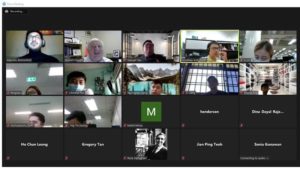
Zena Green, Teaching Fellow in International Programmes, and Dr Holly Foss, BCRRE Director of Education, comment on their experiences in dealing with teaching under Covid-19 constraints.
This blog is extracted from an article which is published in this month’s International Rail Journal.
The global Covid-19 pandemic has had an enormous impact our lives and has significantly disrupted both mobility and education – across the spectrum, with parents of young children suddenly discovering their inner teacher (or not!) to reported 90% reduction in public transport use. Our experience in Higher Education has meant we have shifted, almost overnight, to embrace digital learning and hybrid models of teaching.

Here in Birmingham we teach two MSc-level programmes: Railway Systems Engineering and Integration (RSEI) and Railway Safety and Control Systems (RSCS), the former also offered within the Level 7 Rail & Rail Systems Principal Engineer degree apprenticeship. In addition to these Birmingham-based programmes, we are increasingly working internationally, whereby we deliver specific courses in-country to overseas-based students. How do we manage this within the constraints of a global pandemic?
Closing campuses for the first time in living memory but retaining our commitment to students’ education presented significant challenges of how to achieve both the educational output but also the experience of being a Birmingham student. Across the sector we have adjusted courses to a new, blended learning model and this challenge also pushed us to innovate our courses and helped us to identify areas for change.
Beginning last spring, the shift towards digital methods of learning has led us to a couple of key conclusions and brought unexpected benefits for our staff and students.
Online takes time and effort but opens up significant new opportunities
We all discovered that producing new online learning materials, developing content and making sure it all flows and knits together is a lengthy and skilled process. For online teaching and learning it is important that the digital materials produced are not materials for passive consumption but instead encourage active engagement. A concern around learning online is that students will simply be left to watch hours upon hours of lectures and, across the HE sector, academics have embraced new ways to use digital technologies for delivering teaching whilst engaging students together. Sure, this took a lot of time to learn how to use technology, record the content, review it, and most of us found ourselves re-recording most of it before we were happy! But let’s consider the opportunity to have a discussion between people in 10 or more countries who would not otherwise be able to get together, or for someone simply to turn their laptop around to illustrate an issue in a problem-solving class. Digital also gives us the opportunity to take students to places where otherwise it would be difficult to visit. Yes, a digital course takes time, but the possibilities make it worth it.

Less is more
A meeting which may previously have taken up a whole day, once travel time is considered, now might only take an hour. As with online teaching, it’s been possible to bring people working around the world together for the first time. In turn, this has opened up viable ways to introduce our students to a greater range of industry professionals who have been willing to give up their time to discuss real world examples, both in Britain and overseas.
Of course, digital learning is not for everyone and at BCRRE we are committed to returning to face-to-face teaching when the current Covid restrictions are lifted. For those who have appreciated being able to study part-time while continuing to develop their careers at home or those who have enjoyed the flexibility online learning can bring, we will certainly be looking to continue to develop our digital output in the future.
Find out more about BCRRE education and read the full article in this month’s IRJ here.
